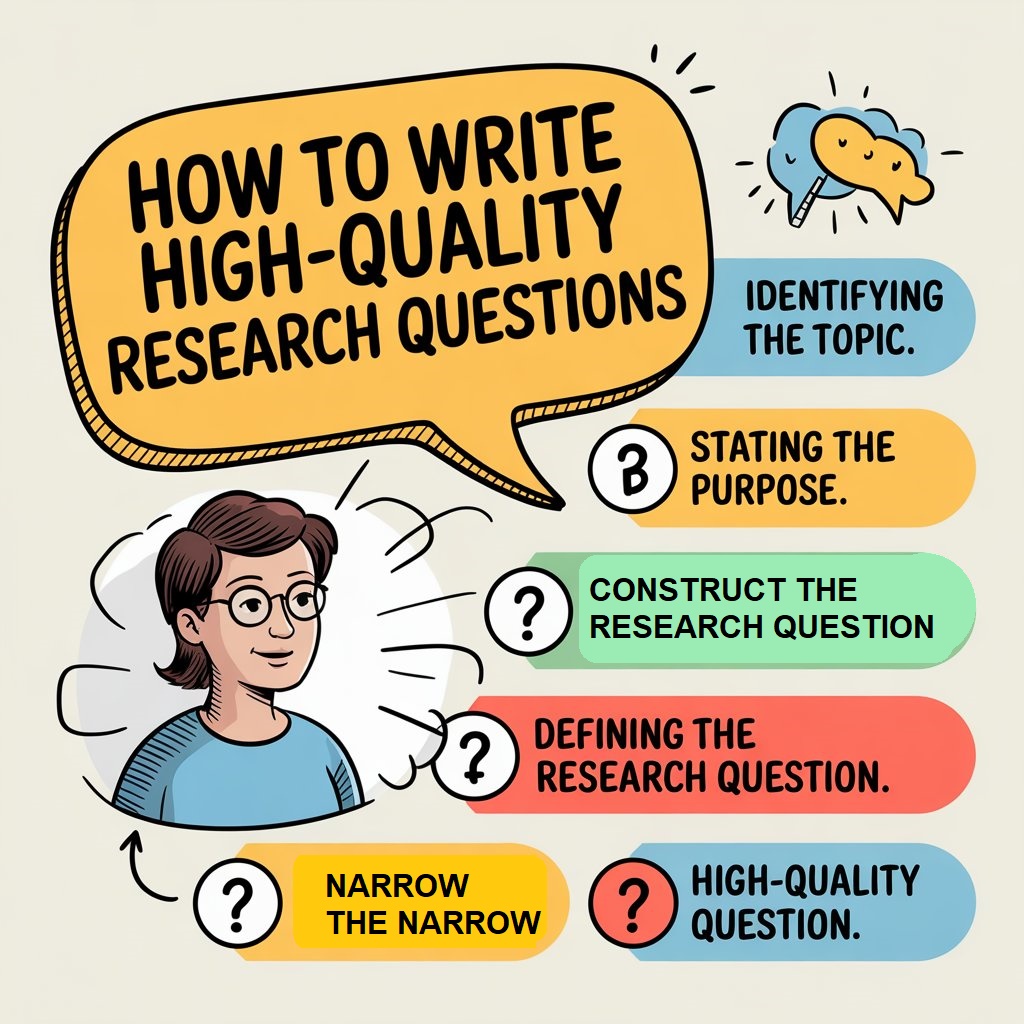What makes a strong research question?
A substantial research question is clear, focused, and researchable. Here are the key characteristics that make a research question strong,
Visit the URL and place your order with us. Fill basic details of your research paper, set the deadlines and submit the form.
Chat with our experts to get the best quote. Make the payment via online banking, debit/credit cards or through paypal. Recieve an order confirmation number.
Sit back and relax. Your well written, properly referenced research paper will be mailed to your inbox, before deadline. Download the paper. Revise and Submit.



Formulating high-quality research questions is critical for students, scholars, and professionals. A well-structured research question provides clarity, direction, and focus, ultimately shaping a study’s success.
Despite the availability of guidance, many overlook the importance of creativity, specificity, and feasibility. This guide outlines best practices for writing impactful research questions, emphasizing clarity, depth, and academic rigor.
A research question is a specific, focused inquiry that defines the objective of a research study. It serves as a guiding principle for the research process, influencing scope, methodology, and data collection. A well-written research question should be:
Research questions serve several critical roles:
These questions involve measurable variables and typically rely on statistical analysis.
Descriptive Research Questions
Aim to describe characteristics of a population or phenomenon.
Comparative Research Questions
Examine differences between two or more groups.
Relationship-Based Research Questions
Investigate correlations or causal relationships between variables.
These questions focus on understanding experiences, behaviors, or perceptions.
Exploratory Research Questions
Seek to understand new or complex phenomena.
Descriptive Research Questions
Capture lived experiences and perspectives.
Explanatory Research Questions
Investigate the underlying reasons or causes behind a phenomenon.
Here are some examples of good research questions across different fields. These questions are clear, focused, and researchable:
Education
How does online learning affect student engagement in high school classrooms?
What is the impact of standardized testing on student mental health?
Environmental Science
How do urban green spaces influence air quality in large cities?
What role do bees play in maintaining biodiversity in agricultural ecosystems?
Psychology
How does sleep deprivation affect cognitive performance in college students?
What are the long-term effects of childhood trauma on adult relationships?
Technology
How has social media usage influenced political participation among young adults?
What are the ethical implications of using AI in hiring practices?
Business
How does remote work impact employee productivity in tech startups?
What strategies do small businesses use to survive economic downturns?
Politics & Society
What factors contribute to voter turnout among first-time voters?
How does media framing affect public perception of immigration policies?
A good tip is to start with a topic you’re curious about, then narrow it down by asking how, why, or what happens when this helps turn it into a strong research question.
4 Examples of quantitative research questions, each focused on collecting numerical data and analysing it statistically:
What is the relationship between daily screen time and academic performance among high school students?
How does the number of hours of sleep per night affect productivity levels in college students?
Does social media use influence consumers’ purchasing behaviour aged 18–25?
How does class size impact standardised test scores in public elementary schools?
How do college students experience anxiety during final exams?
What are the coping strategies used by individuals recovering from burnout?
Education
How do teachers perceive the impact of inclusive classrooms on student learning?
What are students’ experiences of using online learning platforms during the pandemic?
Business & Workplace
How do remote workers describe their sense of connection with colleagues?
What are employees’ perceptions of leadership styles in start-up companies?
Social Sciences & Culture
How do immigrants adapt to new cultural environments in urban areas?
What are the lived experiences of single mothers in balancing work and family?
Health & Healthcare
How do patients describe their interactions with healthcare providers?
What are nurses’ experiences of providing care during a public health crisis?

Step 1: Understand the Research Requirements
Before beginning your research, carefully review the assignment guidelines, institutional expectations, or funding requirements. Understanding these parameters ensures that your research is aligned with the necessary criteria.
Step 2: Choose a Relevant Topic
Selecting the right topic is crucial as it determines the direction of your research. The topic should align with your academic or professional interests and have adequate resources available.
Step 3: Conduct Preliminary Research
Before finalising your topic, review existing research to identify gaps, trends, and key discussions.
Step 4: Narrow the Focus
Once you have a general topic, refine it by defining specific aspects to explore.
Step 5: Construct the Research Question. A substantial research question guides the entire study. To formulate an effective one, use established frameworks:
Feasible – Can the question be investigated using available resources?
Interesting – Does it engage the research community?
Novel – Does it offer new insights?
Ethical – Can the research be conducted ethically?
Relevant – Does it contribute to academic or societal knowledge?
Population – Who is being studied?
Intervention – What is being tested or analysed?
Comparison – What are you comparing it to?
Outcome – What results are expected?
Timeframe – What is the duration of the study?
Specific – Clearly defined scope and objective.
Measurable – Can be quantitatively or qualitatively assessed.
Achievable – Realistic within given constraints.
Relevant – Important to the field.
Time-bound – Defined deadline or timeframe.
Step 6: Evaluate the Research Question
After developing a research question, assess its strength using the following criteria:
Use the following table to refine your research question:
| Criteria | Yes/No | Notes |
|---|---|---|
| Is the question specific? | ||
| Can it be researched with available data? | ||
| Does it contribute to existing literature? | ||
| Is it feasible within the given timeframe? |